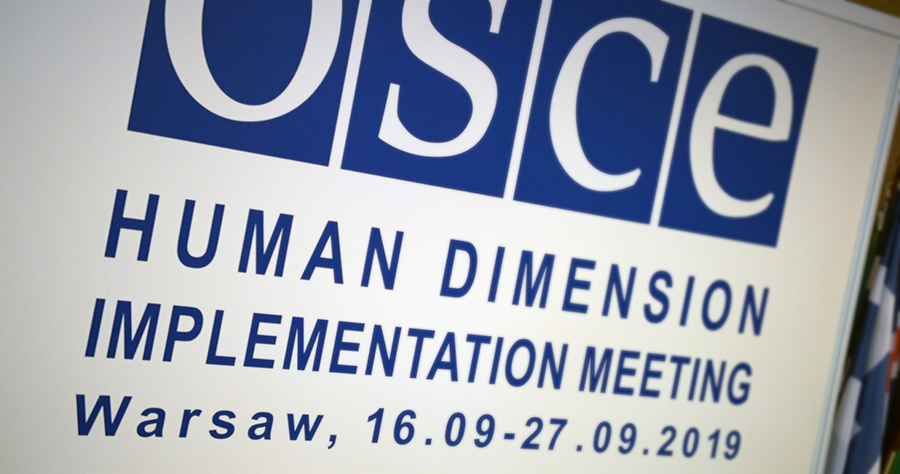2009 OSCE Human Dimension Freedom of religion or belief 29th September 2009
France: From the Committee of Public Salvation to the MIVILUDES
With a whiff of Committee of Public Salvation which used to organise State repression in the name of “public salvation” and “general safety” during the troubled times of the French Revolution, the Interministerial Mission of Watch and Fight against Sectarian Deviations, headed by its new President Georges Fenech, organises the repression of groups it considers as “deviating” in the name of public interest.
In its report 2008, the MIVILUDES explains that the characteristic of sectarian deviations is the existence of mental subjection. According to the report, repression should be initiated by the State when one or several persons “start to adopt ideas which are spread and are different from the ideas usually shared by social consensus”.
In this regard, the report entitled “Justice facing sectarian deviations” submitted by Mr Fenech to the Prime Minister during the summer 2008 gives us an outline of the new orientations of MIVILUDES.
Children of members of minority religious groups must, according to Mr Fenech, be protected from the religious beliefs and practices of their parents. The report quotes and endorses the words of a psychologist who regretted that “children victims of sects remain the all-forgotten of society” perhaps “because it is even more difficult to protect a child from his parents’ beliefs than from their beatings or incestuous sexuality”.
To this end, Mr Fenech recommends that all family matters involving a member of a minority religious group be dealt with by magistrates specialized in sectarian deviations so that the guardianship of children is withdrawn from “deviating” parents, and that these cases be referred systematically to the Prosecutor.
Mr Fenech goes further: according to him, no member of a new religious movement has any free will, so he recommends that the civil judge puts the “consenting followers” under guardianship.
For Mr Fenech, any “sectarian deviation” is a deviation from recognized classical beliefs which implies a mental destabilization and requires normalization through judicial repression and psychological follow-up for the readaptation of followers.
Consequently, the MIVILUDES established a reference list of groups it characterizes as dangerous. Mr Fenech insisted that this list be available for professionals of justice and health. It operates as a true black list nailing down some 500 to 600 movements whose sole crime is that their minority beliefs or practices are considered as suspect. Local officials and public authorities are supposed to use it to know if they should grant the renting of conference halls or nursing licences.
Mr Fenech declared to the press that “500 to 600 sectarian movements are established in France, against less than 200 fifteen years ago” (La Croix newspaper 19 May 2009). But this increase of the number of referenced movements which would justify according to him stepped-up repression is in reality due to the very escalation in the hunting of practices considered as “deviating” and to the inclusion of a larger and larger amount of minority groups or practices in the reference list established by Mr Fenech.
The MIVILUDES, governmental body, acts as a partisan entity which does not take any account of the opinion of sociologists or international instances like the UN. The UN Rapporteur, Asma Jahangir, condemned this policy in 2005 and expressed in her report the hope that “future actions of MIVILUDES will be in line with the right to freedom of religion and belief and avoid past mistakes”.
However, France, with the appointment of Mr Fenech at the head of the MIVILUDES, is in total regression as regards the respect of freedom of conscience. A parishioner of a recognized movement in a neighbouring country becomes in France a “consenting follower” who has to be put under guardianship.
Additionally, Mr Fenech recommends a systematic governmental intervention in the “education” of magistrates in “sectarian issues”. These “education” sessions which are implemented by the Office of Criminal Affairs and Pardon of the Ministry of Justice with the participation of anti-sect associations and based on files established by them on specific minority movements, constitute prejudgements of guilt on the members of the concerned groups.
The Office of Criminal Affairs and Pardon also informed the MIVILUDES of its intention for 2009 to impulse “the development of work meetings between the magistrates in charge of investigations on sectarian deviations and the advisors of [MIVILUDES] so that the knowledge of this structure, in particular on the notion of mental subjection” can be shared. No doubt that the black list of deviating movements will be the main “knowledge” communicated to the magistrates.
This intrusion of the executive power in judicial investigations represents an unacceptable infringement of the independence of justice and a failure by the French authorities to comply with their duty of neutrality vis-à-vis the various religious or philosophical communities existing on their territory.
Ever since the 1975 Helsinki Final Act, freedom of thought, conscience, religion, or belief has been one of the core commitments that each of the OSCE’s 56 participating States has agreed to respect. The repressive system established by the MIVILUDES constitutes a violation by France of this obligation.



